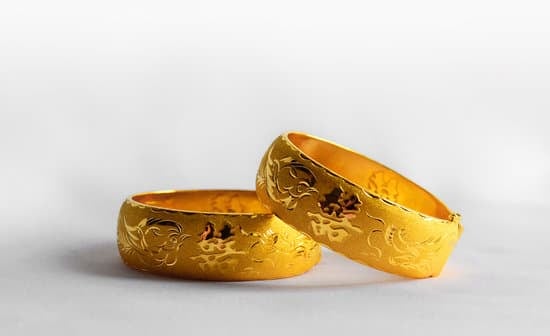Wedding rings hold a special place in the hearts of couples worldwide, symbolizing the eternal bond and commitment shared between partners. One of the most common questions that arises when it comes to these cherished bands is: which finger does the wedding ring go on? The significance of wedding rings transcends borders and cultures, with each society attributing unique meanings to this timeless tradition.
From ancient times to modern-day ceremonies, wearing a wedding ring has been a deeply ingrained custom that signifies unity and love. The historical background of this practice can be traced back through centuries, with various civilizations adopting the tradition for its symbolic representation of marriage. The circular shape of wedding rings represents eternity, while the choice of precious metals like gold or platinum reflects the enduring value placed on the union it signifies.
Traditionally, the wedding ring is worn on the left hand’s ring finger, believed to have a direct connection to the heart through the vein known as “vena amoris.” However, in contemporary times, there has been a shift in trends, leading to variations in which finger the wedding ring goes on. Despite these changes, cultural differences continue to play a significant role in determining where individuals choose to place their wedding rings as a reflection of their heritage and beliefs.
Historical Background
The tradition of wearing wedding rings dates back thousands of years and has been a symbol of love, unity, and commitment in various cultures around the world. The practice can be traced back to ancient Egypt, where rings were exchanged as a symbol of eternity. These rings were typically made from materials like reeds and hemp, signifying the unending cycle of life.
As time progressed, the tradition of exchanging wedding rings spread to ancient Rome and Greece, where they were also seen as a symbol of eternity and fidelity. The Romans popularized the idea of wearing the ring on the fourth finger of the left hand, known as the “vena amoris” or the “vein of love,” believed to be directly connected to the heart.
The circular shape of wedding rings is significant as it represents never-ending love and unity between partners. In addition to this symbolism, the use of precious metals like gold and silver further emphasizes the value placed on marriage and commitment. Throughout history, wedding rings have evolved in design and style but have always remained a timeless symbol of love and devotion.
| Wedding Ring Origins | Historical Significance |
|---|---|
| Ancient Egypt: Rings made from reeds and hemp | Symbolizing eternity in relationships |
| Ancient Rome & Greece: Exchange of rings as symbols of fidelity | Rings worn on the fourth finger connecting to heart vein (vena amoris) |
Symbolism of Wedding Rings
Wedding rings hold significant meaning in various cultures around the world, symbolizing love, commitment, and unity between partners. The circular shape of the wedding ring is often associated with eternity and unending love because it has no beginning or end. This symbolism is reinforced by the choice of precious metals like gold or platinum, which represent durability and value in a relationship.
The circular shape of the wedding ring also represents the never-ending cycle of life and love that two individuals share in marriage. It serves as a constant reminder of the everlasting bond and promises made between partners on their special day. The choice of precious metals further accentuates the symbolism, as they are known for their enduring qualities that mirror the endurance required in a successful marriage.
Whether it’s a simple band or an elaborate design, the wedding ring embodies a deep connection between partners that transcends time and space. The significance of this piece of jewelry lies not only in its material value but also in the emotional weight it carries as a symbol of love and commitment. Understanding the symbolism behind the circular shape and precious metals used in wedding rings can help couples appreciate the deeper meaning behind this timeless tradition.
Traditional Wedding Ring Finger
The traditional placement of the wedding ring on the left hand’s ring finger has deep-rooted cultural and historical significance. This practice dates back to ancient times when it was believed that a vein ran directly from the fourth finger on the left hand to the heart, symbolizing love and commitment. This tradition has been passed down through generations and is widely recognized in many parts of the world.
In Western cultures, it is customary for both men and women to wear their wedding rings on their left hand’s ring finger. This tradition is so prevalent that it has become almost a universal standard for couples exchanging vows. The circular shape of the ring represents eternity and never-ending love, while the precious metals used symbolize the value placed on the relationship.
Interestingly, in some Eastern European countries like Russia, Greece, and Poland, the wedding rings are traditionally worn on the right hand’s ring finger. This tradition dates back centuries and holds different symbolic meanings than wearing the ring on the left hand. However, regardless of which finger does the wedding ring go on, what remains consistent is its representation of unity, commitment, and everlasting love between partners.
| Wedding Ring Placement | Symbolism |
|---|---|
| Left Hand’s Ring Finger (Western cultures) | Love, commitment, eternity |
| Right Hand’s Ring Finger (Eastern European countries) | Different symbolic meanings based on culture |
Modern Trends
In modern times, the placement of wedding rings has evolved beyond the traditional norms, allowing couples to choose which finger to wear their symbol of love and commitment. This shift reflects a more personalized approach to how individuals express their marital status and connection with their partner. While the left ring finger remains significant for many, there are various trends in which people opt to adorn their wedding ring on alternate fingers.
To showcase the diversity in contemporary practices, here are some popular trends and variations in which finger the wedding ring goes on:
- Right Hand Ring Finger: Some cultures or personal preferences dictate that the wedding ring should be worn on the right hand’s ring finger. This choice signifies individuality and can also be a way to break from tradition.
- Index Finger: In recent years, wearing the wedding ring on the index finger has become a trendy choice for those looking for a unique placement. This bold statement sets the ring apart and draws attention to its significance.
- Thumb or Pinky Finger: Unconventional trendsetters have embraced wearing their wedding rings on either the thumb or pinky finger. These placements allow for creativity and a departure from conventional norms.
The flexibility in choosing which finger to wear a wedding ring on showcases how couples can personalize their traditions and symbolize their union in meaningful ways. Whether following cultural customs, personal beliefs, or simply embracing modern trends, the placement of a wedding ring ultimately serves as a reminder of love and commitment between partners.
Cultural Differences
In different parts of the world, the placement of a wedding ring holds deep cultural significance and reflects unique customs and traditions. While many Western cultures typically follow the tradition of wearing the wedding ring on the left hand’s ring finger, there are variations in other regions that showcase diverse beliefs and practices.
Eastern Cultures
In countries like India and Indonesia, it is common for couples to wear their wedding rings on their right hand’s ring finger. This practice stems from cultural beliefs that the right hand is more dominant and represents strength, making it an ideal placement for a symbol of commitment and love.
European Traditions
In some European countries like Russia and Germany, the choice of which finger does the wedding ring go on varies based on local customs. For instance, in Russia, couples often wear their wedding rings on their right hand until after the ceremony when they switch them to their left hand as a sign of marriage completion.
African Customs
Across African nations, the placement of wedding rings can differ significantly depending on specific cultural traditions. In certain communities, couples may wear their wedding rings on different fingers such as the thumb or even around the neck to symbolize unity and connection between spouses.
Exploring these diverse customs around the world not only highlights the rich tapestry of global wedding rituals but also emphasizes the universal importance of a wedding ring as a powerful symbol of love and commitment regardless of where it is worn.
Personal Preferences
Symbolism and Individuality
For some individuals, wearing the wedding ring on a different finger holds personal significance. It may represent a unique and unconventional approach to marriage, symbolizing the couple’s bond in a non-traditional way that resonates with their beliefs. Additionally, choosing to wear the wedding ring on a different finger allows for an expression of individuality and personal style. Some may opt for this placement as a way to stand out or showcase their creativity through their choice of jewelry.
Practical Considerations
Another reason why people may choose to wear their wedding rings on a different finger is for practical reasons. Certain professions or activities may make wearing a traditional wedding ring on the left ring finger uncomfortable or unsafe.
In such cases, individuals may decide to wear their rings on a different finger for comfort and ease of movement. Furthermore, some individuals may have larger knuckles or fingers that make wearing a ring on the traditional finger challenging, leading them to explore other options that offer a better fit.
Cultural Influences
In some cultures, the placement of the wedding ring may vary from the traditional left hand’s ring finger. Cultural influences can play a significant role in determining where individuals choose to wear their wedding rings.
Different regions have distinct customs and beliefs surrounding marriage and symbolism, which can influence how and where the wedding ring is worn. As people navigate between honoring tradition and embracing modernity, cultural influences may impact their decision to wear their wedding ring on a different finger.
Etiquette and Tips
When it comes to wearing a wedding ring, there are certain etiquettes and tips that can help ensure that your symbol of love and commitment stays in top condition. Knowing where to wear the wedding ring is just as important as understanding how to care for it properly. Here are some helpful pieces of advice:
- Placement: Traditionally, the wedding ring is worn on the left hand’s ring finger. This custom dates back to ancient Egypt and Rome, where it was believed that a vein ran directly from this finger to the heart, symbolizing love and fidelity.
- Caring for Your Ring: To keep your wedding ring looking its best, make sure to clean it regularly with mild soap and warm water. Avoid wearing it while engaging in activities that may cause damage or loss, such as swimming or weightlifting.
- Resizing: If your wedding ring becomes too loose or tight over time, consider getting it resized by a professional jeweler to ensure a comfortable fit.
In modern times, there has been a shift in which finger the wedding ring goes on, with some couples opting for non-traditional placements based on personal preferences or cultural influences. Some individuals choose to wear their wedding rings on their right hand’s ring finger, while others may even choose different fingers altogether. Ultimately, the most important aspect of wearing a wedding ring is what it symbolizes – a lifelong commitment and bond between two individuals.
Remember that where you wear your wedding ring is entirely up to you and what feels right for your relationship. Whether you adhere to tradition or create your own unique customs, the placement of the wedding ring serves as a reminder of the love shared between partners. By following proper etiquette and care tips, you can ensure that your wedding ring remains a cherished symbol for years to come.
Conclusion
Wedding rings have served as symbols of love and commitment across various cultures and time periods. The tradition of wearing a wedding ring dates back centuries, with different meanings attached to the circular shape and the choice of precious metals. While traditionally placed on the left hand’s ring finger, modern trends have given rise to variations in where the wedding ring goes, allowing for personalization and individual expression.
Cultural differences play a significant role in determining which finger the wedding ring goes on, with customs varying around the world. Some cultures place importance on specific fingers or hands for the wedding ring, reflecting deep-rooted traditions and beliefs. Additionally, personal preferences also come into play when deciding where to wear the wedding ring, with some individuals opting for unconventional placement as a reflection of their unique style or values.
In conclusion, regardless of the finger on which it is worn, the wedding ring remains a powerful symbol of love and commitment between partners. Whether following traditional practices or embracing modern trends, what truly matters is the sentiment behind the act of exchanging rings. Ultimately, it is this meaningful gesture that solidifies the bond between two individuals and serves as a constant reminder of their enduring partnership.
Frequently Asked Questions
Is the Wedding Ring on the Left or Right Finger?
The tradition in many Western cultures is to wear the wedding ring on the left hand, specifically on the fourth finger, also known as the ring finger. This tradition dates back centuries and symbolizes love and commitment.
Which Finger Is for Wedding Ring for Male?
The traditional finger for men to wear their wedding ring is also on the left hand, on the same fourth finger where women typically wear their wedding rings. This consistency symbolizes unity and equality within the marriage bond.
Why Do Some People Wear Wedding Ring on Right Hand?
Some people choose to wear their wedding ring on their right hand for a variety of reasons. In some Eastern European and some South American countries, it’s traditional to wear the wedding ring on the right hand for cultural or religious significance.
Additionally, wearing the wedding ring on the right hand might be a personal choice or practical consideration for those who are left-handed or have occupations that make wearing a ring on their dominant hand more comfortable.

I have been involved in marriages for over 20 years helping couples and singles understand more about them.





